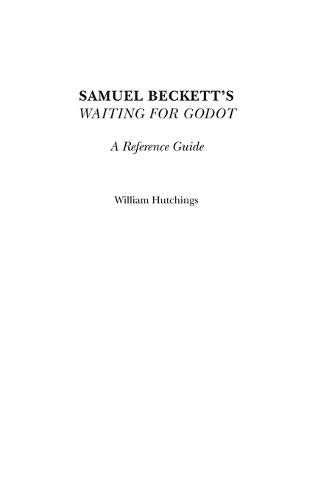Overview
No modern play in the western dramatic tradition has provoked as much controversy or generated as much diversity of opinion as Samuel Beckett's Waiting for Godot. Since its initial production in 1953, it has revolutionized the stage through its existentialism and apparent rejection of plot. This book is a valuable introduction to the play. It begins with a summary of the play and its origins and editions. It then explores the play's meaning and the historical and intellectual contexts informing Beckett's work. The book then examines Beckett's dramatic art and gives full coverage of the play's performance history. A bibliographical essay surveys the most important critical studies.
Full Product Details
Author: William Hutchings
Publisher: Bloomsbury Publishing Plc
Imprint: Praeger Publishers Inc
Dimensions:
Width: 15.60cm
, Height: 1.20cm
, Length: 23.50cm
Weight: 0.397kg
ISBN: 9780313308796
ISBN 10: 0313308799
Pages: 186
Publication Date: 30 May 2005
Recommended Age: From 7 to 17 years
Audience:
Professional and scholarly
,
Professional & Vocational
Format: Hardback
Publisher's Status: Active
Availability: Manufactured on demand

We will order this item for you from a manufactured on demand supplier.
Reviews
[P]rovides a summary of the play's plot, a description of the various texts and editions available, a discussion of the play's intellectual content, an essay on its meaning, and overview of its dramatic art, a history of its performance worldwide through 2004, and a bibliographic essay directing readers to further reading. - Reference & Research Book News Hutchings places Waiting for Godot on a par with Oedipus Rex and Hamlet in terms of meaning: the three plays have inspired more puzzled arguments than most other dramatic works. Beckett's set is a lone tree, and his characters are only waiting--supposedly--for the central character, who never comes or communicates. The play's meaning, if it has any, has left many playgoers spellbound and confused others. First produced in 1953, the play has fascinated an audience drawn by Beckett's questions: Why are we here? Are we alone in an uncaring universe? What are we to do while we are here? How can we know? And, ultimately, what does it matter? Though Hutchings provides no answers to these questions, he does provide an excellent guide to this complex and puzzling play. Recommended. Upper-division undergraduates through faculty. - Choice
?Hutchings places Waiting for Godot on a par with Oedipus Rex and Hamlet in terms of meaning: the three plays have inspired more puzzled arguments than most other dramatic works. Beckett's set is a lone tree, and his characters are only waiting--supposedly--for the central character, who never comes or communicates. The play's meaning, if it has any, has left many playgoers spellbound and confused others. First produced in 1953, the play has fascinated an audience drawn by Beckett's questions: Why are we here? Are we alone in an uncaring universe? What are we to do while we are here? How can we know? And, ultimately, what does it matter? Though Hutchings provides no answers to these questions, he does provide an excellent guide to this complex and puzzling play. Recommended. Upper-division undergraduates through faculty.?-Choice
Author Information
William Hutchings is Professor of English at the University of Alabama, Birmingham.



